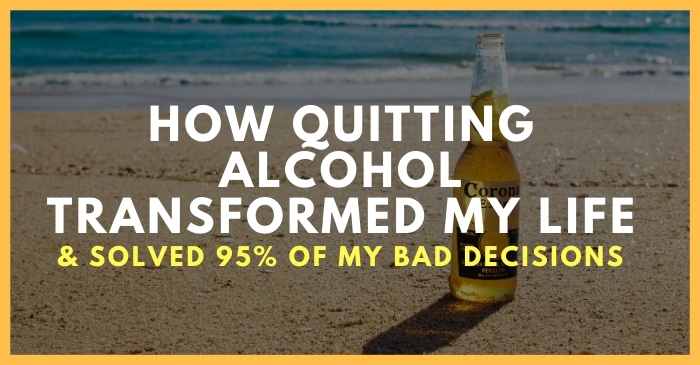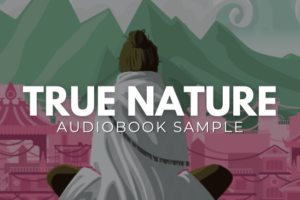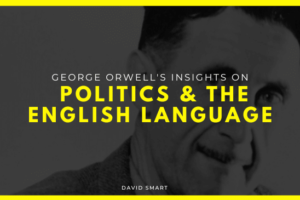I drank a lot in college. Especially freshman year. For whatever reason, it seemed like there was a party every other night. With each subsequent passing year, those parties and my drinking lessened, but the habit remained.
I never did anything to land me into trouble, thank God. The worst was probably a few years taken off my lifespan and sleeping around a bit too much for my own good. Then there were habits of smoking and dipping.
I drank even less while working my digital marketing job post-college, but still frequently on the weekends and sometimes during the week. I remember the fancy dinners. Venders courting us, trying to wine-and-dine us to win over our business.
I found myself waking up after a night of drinking. Maybe I shouldn’t have done that. Maybe that was a mistake.
Drinking was never a major problem of mine. At least, I didn’t think so. I wasn’t addicted. I never blacked out* (post-college*) and I handled myself fairly well on most nights out. I was a responsible, law-abiding citizen working a full-time job, moving up the corporate ladder. Just a normal dude who needed to relax a bit on the weekends.
No big deal, right?
Looking back, alcohol played a bigger role in my poor decision-making than I had thought at the time.
It was only when I stopped drinking that I realized what a difference sobriety made.
Realization
I remember one night in particular, I realized something.
Alcohol was the first domino from which every other vice followed. It was those initial couple of drinks that brought about a snowball of hedonic impulses.
Drinking amplified cravings for secondary and tertiary sensory inputs and pleasures. Anyone got dip? Wanna smoke? I need some late-night Whataburger. Should I text her this late?
One day, I decided to go cold turkey.
It was hard at first. Not because it was hard to quit–I never really enjoyed the taste in the first place–but rather because I felt pressured to make my friends happy. For so long, it was my identity to be the life of the party and enjoy drinking with friends.
“You can’t just have one drink?” my friends asked at first.
I could, but that’s what started the chain of additional cravings.
So I kept saying no thanks. And that was all it took.
The more I turned down my friend’s well-meaning offers, the more they understood and stopped offering. There came a point in time where I didn’t have to think twice about saying no. Sobriety became second nature.
The Result
The change was dramatic and noticeable. My greatest vices quickly vanished. I’m imperfect, but those unhealthy habits–drinking, smoking, dipping, late-night binging, sleeping around–were cut from the root. By removing alcohol, their appeal faded.
New behaviors emerged. Without alcohol, I woke up with the energy to create. I wrote during the day and read more often at night. I exercised more frequently. I went to bed and woke up early. I no longer dwelled in the past so often, wondering about past mistakes and creating new ones. Overall, my entire life improved.
Why We Drink
At the root, both drinkers and tea-totalers share the same desire: to bring order to the mind, to experience freedom, and to suffer less.
It’s common to experience an endless barrage of thoughts, identification with thought, and the delusion and suffering that accompanies it. It’s equally as common to experience unpleasant sensations, identification with sensations, and the accompanied suffering.
Both wish to escape this cycle but employ different tactics to accomplish this goal.
One tactic (sobriety) requires work. The other tactic (drinking) requires leisure. The former takes discipline and curiosity. The latter provides instant gratification. Sobriety is concerned with taking control and making choices. Drinking is concerned with losing control and letting go of choices. Abstaining requires feeling your feelings. Drinking attempts to dull your feelings.
But the question arises: do both methods solve the problem?
Sensations
Alcohol is well known for its anesthetic quality. Once used on surgical patients, the effect numbs bodily sensations (or more accurately, the mind’s awareness of them), making alcohol a seemingly effective tool for reducing suffering. Likewise, drinking seems to allow us an escape from the mind’s incessant chatter.
But here lies the catch: these sensations contain important information and escaping thought leaves us no batter to handle them when the effects wear off. Such an anesthetic only delays and amplifies the inevitable.
Such was my conclusion with sobriety. Even though sensation and thought were at times unpleasant, pain and discomfort could be pathways for growth. Witnessing the body and mind sparks decision-making and cultivates new habit patterns.
Perhaps one day, I’ll adopt a different perspective. But so far, there’s nothing alcohol can offer me that I haven’t found elsewhere.
Sobriety changed my life. So, cheers to that.
I hope you enjoyed the read. If you did, please share it with a close friend and consider following the journey
Wishing you well.
Love,
David





2 Comments
Leave your reply.